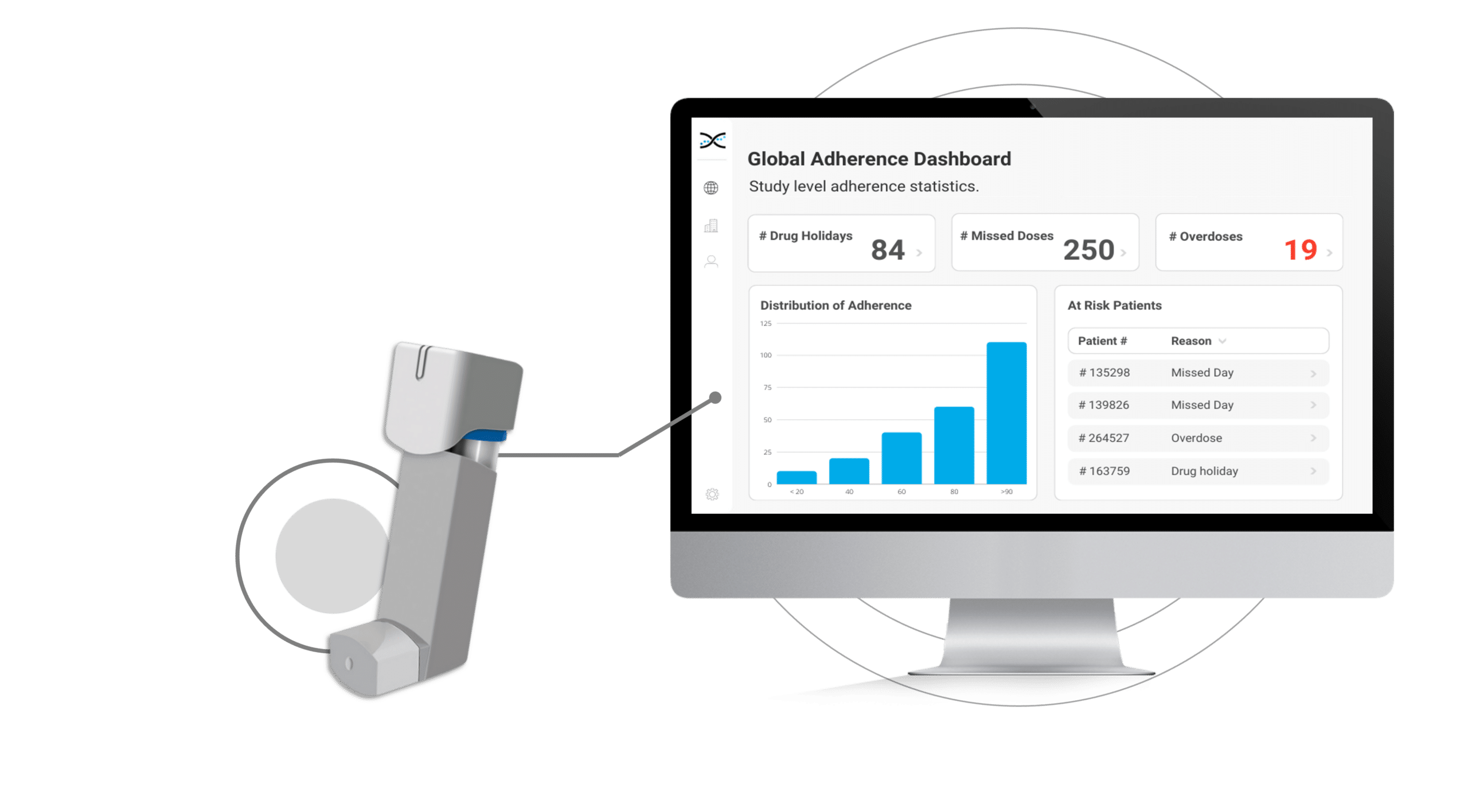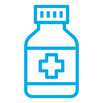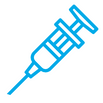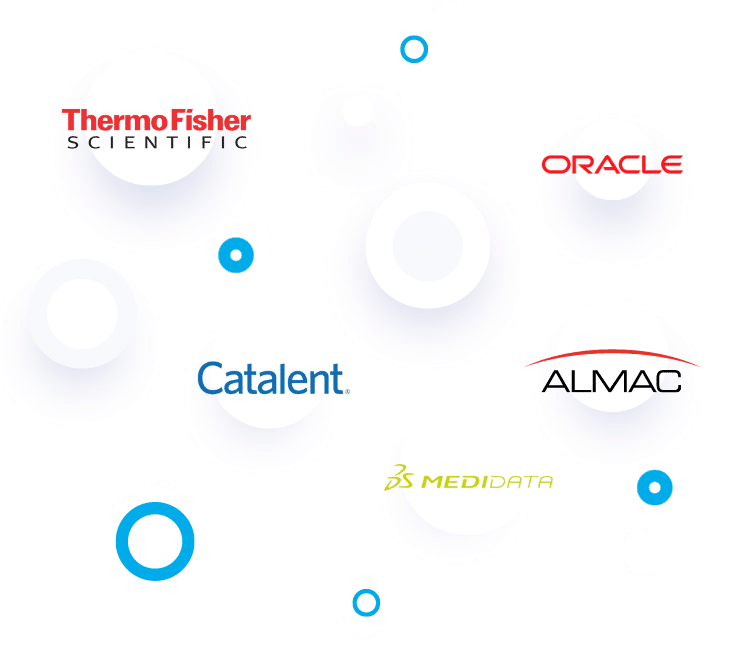HeroTracker® Sense Smart Inhaler Add-On

Transform standard metered dose inhalers (pMDI) into smart inhalers with the HeroTracker Sense. Medication event data is captured automatically by hidden sensors in the HeroTracker Sense and passed to AARDEX Group's medication adherence software, MEMS AS®. Combining these innovative solutions allows patients to manage their medications more effectively while providing researchers real-time treatment compliance analytics.


HEROTRACKER SENSE
Convert Standard Inhalers Into Smart Inhalers
Patients with respiratory conditions such as asthma and Chronic Obstructive Pulmonary Disease (COPD) face challenges maintaining treatment compliance, which can compromise their ability to achieve the desired therapeutic effect. Forgetfulness, misunderstandings about the dosing regimen, lack of motivation, psychological factors, and side effects can all contribute to this challenge. That's where smart inhalers come in.
Smart inhalers can help patients stay on track with their medication and improve compliance. The HeroTracker Sense can be attached to a metered-dose inhaler (MDI), effectively transforming standard inhalers into smart inhalers designed to provide patients real-time feedback on their inhalation technique and medication usage. The device contains sensors that allow for collecting various data points, such as the coordination of inspiration with actuation, flow rate, and inhalation duration. The device's accompanying app also provides patients with the date and time stamps indicating when they should take their medication and environmental monitoring alerts, including temperature and humidity. With these features, patients can more effectively manage their medication regimen, improving compliance with their prescribed dosing schedule.
Moreover, HeroTracker Sense integrates seamlessly with AARDEX Group's medication adherence software, providing researchers with vital treatment compliance analytics at the patient, study, and site levels. This integration enables researchers to identify patients who may require additional support with their medication regimen, helping to ensure that they receive the best possible care. With HeroTracker Sense, patients and researchers can feel confident managing respiratory conditions effectively.

FEATURES
Compliance Insights in Real-Time.
The integration of HeroTracker Sense smart inhaler with MEMS AS represents a significant breakthrough in how researchers can measure treatment compliance adherence for inhalable medications. The device collects medication event data from inhalers, and it uses over seventy MEMS AS adherence algorithms to generate a series of intuitive, cloud-based dashboards. These dashboards provide researchers with valuable insights into compliance patterns, including medication holidays, missed doses, and overdoses, across patients, study sites, and the entire study. Access to this type of intelligence is critical for researchers as it enables them to identify opportunities for coaching and support, helping patients to stay on track with their medication regimen. With HeroTracker Sense and MEMS AS, researchers have the tools to better understand patient behavior and treatment compliance, ensuring that they can make informed decisions based on accurate and reliable data.
- Fully Scalable
- ISO27001 Certified Datacenter
- HIPAA & GDPR Compliant
- IRT, EDC & DCT Integration

FEATURES
Compliance Enhancing Features.
Eliminating barriers to medication adherence in clinical trials is paramount for optimizing participant outcomes and maintaining research integrity. We recognize the importance of user-friendly solutions that place no burden on participants, simply requiring them to take their medication as prescribed. In addition, our solutions offer participants access to MEMS® Mobile, a convenient app that allows them to schedule medication reminders, helping them to stay on top of their dosing regimen. Our patient-centric approach to medication adherence strives to empower participants and help them achieve better outcomes.
- User-Friendly App
- IoS & Android Compatible
- Available in 25 Languages
- 20K+ Users in 30 Countries

FEATURES
Patient-Centric Solution.
In addition to its ease of use and integration into daily routines, the HeroTracker Sense smart inhaler offers patients a range of features that make it an invaluable tool for managing respiratory conditions. The device contains sensors that can detect inhalation, providing patients real-time feedback on their inhalation technique and medication usage. This information can help patients to adjust their technique, ensuring that they are using their inhalers correctly and receiving the full benefit of their medication. The HeroTracker Sense empowers patients to take control of their health and improve their overall well-being by providing patients with a better understanding of their medication usage and inhalation technique. It also enables healthcare providers to deliver personalized care tailored to each patient's unique needs, resulting in better health outcomes and improved quality of life for patients with respiratory conditions.
- Participant Acceptability High
- User-Friendly Solutions

OUR CLIENTS
The Go-To Solution for Pharma Companies
Some of the world's leading pharmaceutical companies have embraced our medication adherence solutions. From global giants to niche players, these organizations have recognized the value of our innovative solutions for enhancing medication adherence, reducing costs, and improving patient outcomes. It's an honor to partner with these remarkable brands, and we're proud to contribute to their efforts in advancing healthcare.

Medication Adherence Software →
Learn about our industry-leading adherence software for trials.

Medication Adherence Packaging →
Discover our range of medication adherence packaging.

Discover our range of medication adherence devices.
Got Questions?
Connect with an adherence expert.
Frequently Asked Questions
Treatment compliance is a vital yet often overlooked aspect of successful research. That's why we've gone the extra mile to gather and organize the most frequently asked questions about this critical topic. Our goal is to empower researchers and patients alike with the knowledge they need to ensure medication adherence is never a hurdle to progress. So, without further ado, here are the answers you've been looking for!
Treatment compliance refers to the degree to which patients follow the recommended treatment regimen, including medication use, lifestyle changes, and other prescribed therapies. In other words, treatment compliance measures how well patients adhere to the recommended dosage, frequency, and treatment plan duration as prescribed by their healthcare provider.
For example, in the case of medication, compliance refers to whether a patient takes their medication as directed, at the prescribed time, and in the recommended dose. Compliance can also refer to whether patients follow the recommended lifestyle changes, such as exercise or dietary modifications.
Treatment compliance is critical to achieving optimal clinical outcomes, ensuring patients receive the full benefit of the recommended treatment. Poor compliance can result in suboptimal clinical outcomes, disease progression, and an increased risk of adverse events.
Therefore, healthcare providers prioritize ensuring treatment compliance by providing education, support, and monitoring to help patients adhere to the recommended treatment regimen. Patients can achieve better health outcomes and improve their overall quality of life by improving treatment compliance.
Improving treatment compliance can be challenging, but there are several strategies that healthcare providers can use to help patients adhere to their recommended treatment regimen. These strategies include educating patients about their condition and treatment, simplifying treatment regimens, providing patient support, using reminder systems and incentives, leveraging technology to monitor adherence, conducting close monitoring and counseling, and building trust and rapport with patients. By addressing these factors and using a combination of strategies, healthcare providers can help to improve treatment compliance, enabling patients to achieve optimal clinical outcomes and better overall health.
Many factors can affect treatment compliance, including:
Patient education: Patients who do not understand the benefits of their treatment or who lack knowledge about their condition may be less likely to comply with their prescribed treatment.
Complexity of the treatment regimen: Complex treatment regimens requiring multiple doses or lifestyle changes may be more challenging for patients.
Side effects: Side effects of medication can sometimes be unpleasant or uncomfortable, which may lead patients to discontinue or alter their treatment regimen.
Health literacy: Patients with low health literacy or limited language proficiency may struggle to understand their treatment plan or follow medication instructions.
Psychological factors: Patients with mental health conditions, such as depression or anxiety, may have difficulty adhering to their treatment regimen.
Socioeconomic factors: Patients who face socioeconomic challenges, such as poverty or limited social support, may struggle to comply with their treatment regimen.
Cultural factors: Cultural beliefs and practices may impact treatment compliance, as patients may prioritize alternative therapies or have concerns about the safety or efficacy of specific treatments.
By identifying and addressing these factors, healthcare providers can help to improve treatment compliance, enabling patients to achieve better health outcomes and improve their overall quality of life.
There are several barriers to adherence to inhalable medications, which can make it difficult for patients to take their medication as prescribed. Here are some of the most common barriers:
Complexity: Inhalers can be complex to use, and patients may not receive adequate instruction on how to use them properly. This can lead to incorrect use of the inhaler, which can reduce the effectiveness of the medication.
Forgetting to Use the Inhaler: Patients may forget to use their inhaler, especially if they are not experiencing symptoms at the time of the scheduled dose.
Fear of Side Effects: Some patients may be reluctant to take their medication due to concerns about potential side effects.
Lack of Understanding: Patients may not fully understand the importance of taking their medication as prescribed, or they may not understand the consequences of not taking their medication.
Stigma: Patients with respiratory conditions may experience stigma or discrimination, which can lead to non-adherence to medication.
Cultural Barriers: Cultural beliefs and practices may also impact adherence to medication.
Overall, these barriers can make it difficult for patients to adhere to inhalable medications, which can lead to worsened symptoms and decreased quality of life. Researchers should be aware of these barriers and work with patients to develop strategies to overcome them.
A smart inhaler is a type of inhaler that incorporates electronic sensors and wireless connectivity to provide feedback to patients and healthcare providers on inhaler usage and medication adherence. This type of inhaler is also known as an “electronic inhaler” or “connected inhaler”.
Smart inhalers typically have a small electronic module that tracks when and how often the inhaler is used, as well as the dosage delivered. This information can be transmitted wirelessly to a mobile app or web-based platform, where patients can access data on their inhaler usage and receive reminders to take their medication. Healthcare providers can also access this data to monitor patient adherence and adjust treatment plans as needed.
In contrast, a normal inhaler is a conventional inhaler that delivers medication to the lungs in the form of an aerosol spray. Normal inhalers do not have electronic sensors or wireless connectivity, and do not provide feedback on inhaler usage or medication adherence.
Smart inhalers have the potential to improve medication adherence, reduce healthcare costs, and improve patient outcomes by providing patients and healthcare providers with real-time data on inhaler usage and medication adherence.
There are several advantages to using smart inhalers over traditional inhalers:
Improved medication adherence: Smart inhalers can help patients stick to their prescribed medication regimen by providing reminders to take their medication, tracking their inhaler usage, and providing feedback on their medication adherence.
Real-time monitoring: Smart inhalers provide real-time data on inhaler usage, which can help healthcare providers monitor their patients’ treatment and adjust their medication regimen as needed.
Better patient outcomes: Improved medication adherence can lead to better patient outcomes, such as reduced symptoms, improved lung function, and fewer exacerbations.
Cost savings: Smart inhalers can help reduce healthcare costs by reducing hospitalizations and emergency room visits caused by uncontrolled asthma or COPD.
Personalized treatment: The data provided by smart inhalers can help healthcare providers personalize treatment plans for their patients, which can lead to more effective and efficient treatment.
Improved patient education: Smart inhalers can provide patients with educational resources and tips for proper inhaler technique, which can help them get the most out of their medication.
Overall, smart inhalers have the potential to improve the management of respiratory conditions and enhance patient outcomes, while also reducing healthcare costs.
There are two main types of smart inhalers:
- Sensor-based smart inhalers: These inhalers use electronic sensors to detect and record when a dose is taken, the amount of medication dispensed, and other usage data. This data is then transmitted wirelessly to a mobile app or web-based platform for analysis. Sensor-based smart inhalers can be further categorized into two subtypes:
Add-on sensor: An add-on sensor can be attached to a standard inhaler to make it smart. These sensors are often small and unobtrusive, and can be easily removed or transferred to another inhaler.
Integrated sensor: An integrated sensor is built directly into the inhaler device, and is designed to be used specifically with that device. This type of smart inhaler is typically more expensive than an add-on sensor.
- Inhaler-plus-sensor combination products: These are inhaler devices that are designed with an integrated sensor that connects to a mobile app or web-based platform. These inhalers are often more expensive than traditional inhalers, but they offer the convenience of having the sensor and inhaler integrated into a single device.
WEBINAR WITH MERCK & BIOGEN
Mitigating the Risk of Poor Adherence in Trials
Watch this live recording with adherence experts from Merck & Biogen to learn about their approach to mitigating the risk of poor adherence in trials.

Collaborating for Safer, More Efficient Trials.
By combining technology and partnerships, we are revolutionizing how medication adherence is monitored in clinical trials. Our unique adherence ecosystem brings together leading medication adherence packaging and devices and DCT, IRT, and EDC vendors, CROs, and CMOs to drive innovation.
